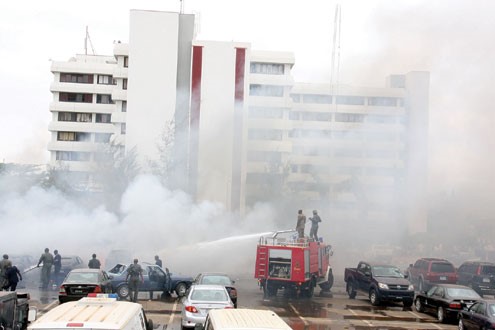Andrew McGregor
July 1, 2011
 Aftermath of the Police Headquarters Bombing
Aftermath of the Police Headquarters Bombing
Styling themselves as the Muwahiddin [Unitarians], a common self-appellation for Wahhabists and Salafists, Nigeria’s Islamist extremists have shared a number of their goals and aims in a statement carried on jihadist websites entitled “Demands of the Muwahiddin to the Tawaghit [those who rule without recourse to the Shari’a] and their Allies in Nigeria” (ansar1.info, June 21). The statement is allegedly penned by “Abu Muwahid” for the Brigades of Tawhid [Oneness of God] Publications.
The statement claims that the June 16 car bombing of the national police headquarters in Abuja (described here as a “martyrdom” or suicide bombing) had thrown the Nigerian tawaghit into a state of confusion and panic, leading them to seek negotiations with the Islamist militants (or Boko Haram, though the movement is not mentioned by name in the statement; For the bombing, see Terrorism Monitor Brief, June 23). However, the Islamists indicate that they have no interest in pursuing talks with the government: “One major thing they forgot in their consideration of negotiation is that our millah [religion], the millah of Ibrahim, forbids negotiating with all those who have rejected the supremacy of Allah’s Shari’a and all those who have taken themselves as lords besides Allah.”
Reacting to suggestions that a combination of incentives and amnesty might bring Boko Haram to the negotiating table much as it did southern Nigeria’s Movement to Emancipate the Niger Delta (MEND), the Salafists responded: “They initially thought that our ideology could be bought off with materialism like the MEND Militants of the Niger Delta region. Our ideology is far from materialism; it is an ideology that abhors shirk [polytheism] and kufr [disbelief] and seeks to eradicate the tawaghit and all their allies in the whole universe, such that the earth will become purified and all ibadah [worship] will then be directed solely to Allah.”
In addressing Nigeria’s Islamic scholars, the Muwahiddin raise the issue of colonialism, asking the scholars if they have “forgotten the pains of your fathers in the hands of the white monkeys?,” while reminding them it would be treacherous to be seen in the forefront of the grandchildren of former Nigerian colonial governors such as “Lugard, Richard, MacPherson and other white criminals whose hegemony still reigns over our head after 108 years.” [1]
With the first claimed suicide bombing in Nigeria, there are fears that others will follow, leaving Nigeria destitute of new foreign investment. As a statement from the Nigerian political party Action Congress of Nigeria (ANC) noted: “No foreign investor will wait for a travel advisory from his/her government before deciding not to visit a country where security is not guaranteed, where a drink in a pub can fetch one a bomb” (The Nation [Lagos], June 20). Meanwhile, the Nigerian police have backed away from their earlier belief that the bombing was a suicide attack, now stating instead that the evidence is inconclusive (Nigerian Tribune, June 23).
Much of the response of Nigeria’s many security services to the security crisis has consisted of trying to blame each other for the “intelligence failure” that President Goodluck Jonathan has identified as the cause of the ongoing violence in Borno and Bauchi states and its spread to the capital city of Abuja (Vanguard, June 26). Nigeria’s security services tend towards competition rather than cooperation, and intelligence sharing is a low priority.
The militants’ statement affirmed the loyalty of the Nigerian muwahiddin to the new al-Qaeda leader, “the Amir of our caravan, Shaykh Ayman al-Zawahiri.” The Nigerian Salafists also expressed their appreciation for the work of leading Jordanian Salafi-Jihadi ideologue Abu Muhammad al-Maqdisi, once the mentor of the late al-Qaeda in Iraq leader Abu Musab al-Zarqawi. The Salafist message also alludes to the arrival of foreign jihadists in Nigeria, who will “surely make Nigeria ungovernable the same way our brothers in Somalia have made the country ungovernable for the apostate stooge [Somali president Shaykh] Sharif [Shaykh] Ahmad.”
Even after the attempt to destroy the leadership and the Abuja headquarters of Nigeria’s national police, Boko Haram violence continues unabated in northern Nigeria. Twenty-five people were killed in Maiduguri on June 26 when motorcycle-riding militants threw bombs at local outdoor beer parlors (Vanguard, June 27).
Note:
1. Sir Frederick Lugard, Governor General of Nigeria, 1914-1919; Sir Arthur Richards, Governor of Nigeria, 1943-1948; Sir John Stuart MacPherson, Governor of Nigeria, 1948-1954, Governor General of Nigeria, 1954–1955.
This article first appeared in the July 1, 2011 issue of the Jamestown Foundation’s Terrorism Monitor
